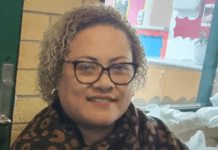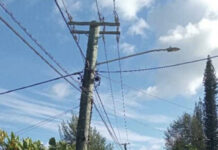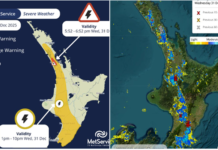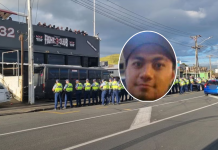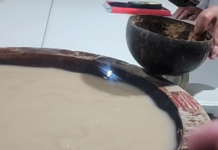A Canadian rugby player with a love for Polynesia is encouraging people to learn Tongan through a series of on-line videos.
Andrew Joakim, who played rugby in Australia, New Zealand and Tonga, has created a series of entertaining Tongan language instructional videos.
In the videos, he demonstrates that he can accurately and confidently pronounce Tongan words while also making jokes, pointing out cultural differences, and even demonstrating his Tongan and Samoan dancing skills.
Kaniva News contributor Todd Henry, who shares Joakim’s North American background, was intrigued to find Tongan language lessons coming from somewhere so geographically and culturally remote from the Pacific.
He tracked Joakim down and this interview is the result.
Henry: Let’s start with the basics then, where are you originally from?
Joakim: I am originally from Tottenham, Ontario, it’s a small town in Canada.
Henry: Are you part Tongan?
Joakim: I’m not at all Tongan or Polynesian. My mother moved to Canada from Scotland and my Dad moved here from India.
Henry: Eastern Canada isn’t known for having a significant population of Tongan expats, so how did you first find out about Tonga? What made you want to begin learning about Tongan language and culture?
Joakim: I went to play rugby in Inverell in New South Wales. All of the other import players were from Tonga, our club had a connection with the Ha’ateiho Spartans. I hadn’t heard of Tonga before that. I was working with them, and I was fascinated by their stories about home.
Our team went for an end of season trip, and I fell in love with Tonga. Usually when on vacation, I would get sick of the place by the end and look forward to going home. But when visiting Tonga, I didn’t want to leave.
After that, I went to play in Dargaville in New Zealand and lived in a house for import players, they were all Tongan. I used to watch a Maori TV show about Te Reo and learned a bit of it. I worked at Silver Fern farms, there were plenty of Tongans. All of the signs at work were in English and Tongan, so I started picking a little bit up.
Henry: What year was that?
Joakim: I went to Australia in 2007, played two seasons, Tonga in 2008, New Zealand in 2009
Henry: What was it about Tongan culture that had such a profound effect on you?
Joakim: Mostly it was the attitude of the people. They are such genuine, friendly and positive people. I remember I was walking by myself and I was seen by a group of friends eating, they called over to me to come join them.
Henry: Where in Tonga did you spend most of your time?
Joakim: When I first visited, just in Nukualofa. But in 2010 my parents were considering buying a bar in Neiafu, so I went with them. They didn’t end up getting it, but I became friends with a family and ended up staying there for six months, this was in Utungake.
Henry: So your parents share your affinity for Tonga?
Joakim: Not really, they were just interested in a change, but it was too dramatic of a change for them. They ended up settling in British Columbia.
Henry: Do you have plans to move permanently back to Tonga or elsewhere in the Pacific one day?
Joakim: My dream would be to split my time between New Zealand and either Tonga or Samoa, that way I could enjoy the best of both worlds.
Henry: Your Lea Faka Tonga instructional videos on YouTube are getting a fair bit of attention online as of late. How would you rate your fluency in the language?
Joakim: I’m not as good as I used to be, when I was in Vava’u I was much better. I haven’t really had a chance to use it much since then. I can watch the Tongan Broadcasting Corporations news programs on YouTube and understand most of what they are saying, and in conversation I can get my point across. But now I am focusing on getting better at it, I want to be the best Palangi at speaking Tongan. Not for bragging rights, I just love the language and the culture, and I love the reaction I get from Tongans. After hearing me speak they think I served a mission, when they find out I haven’t they seem so surprised.
Henry: That’s a great goal, and we are up against some stiff competition! Are you a polyglot (speaker of many languages)? Or is it just English and Tongan in your linguistic arsenal?
Joakim: Growing up in Canada we had to learn French, I only retained a little bit of it. After learning Tongan I learned Samoan. I am not as good in Samoan as I am with Tongan, but I learned enough for when I spent some time there teaching a computer class at a high school in Savai’i. I’m thinking of doing a video where I show myself learning Uvean, or Futunan, to show that adults can learn as long as they have the passion to do so.
Henry: So are you well travelled in the Pacific Islands?
Joakim: I’ve been to Tongatapu, a few islands in the Vava’u chain, Savai’i and Upolu in Samoa. I would like to see Tokelau before the ocean swallows it up. Would also love to see Futuna, Uvea, Ha’apai, and the Niuas. If I were to go to Uvea and Futuna, it would be interesting to see how I could get by with the Tongan and Samoan that I know.
Henry: There is a lot of crossover with all of the Polynesian languages, the Austronesian language group itself reaches from the Pacific Islands all the way out to Madagascar.
Joakim: Yeah, it’s fascinating.
Henry: Are there any Tongans that live near you in Canada?
Joakim: Last summer I was a team liaison for the Ikale Tahi for their Toronto leg of the Pacific Nations Cup, and I got to meet the Tongans that live in Toronto. There are not many of them, probably no more than ten. It’s a small world, one of them is friends with my cousin.
Henry: Yes, there are relatively few intrepid Tongans who have settled on the cold eastern seaboard of North America. I know of only one Tongan family that resides in my home state of Pennsylvania, they own a very successful business in their town. There are surely more Tongans in Pennsylvania, but I have yet to meet them.
This leads into my next question: Many Tongans now live in places that don’t have established Tongan communities, which obviously makes retaining or learning the language more difficult. What tips do you have for learning Tongan in a place where it’s impossible to go out in public and practice by speaking directly to other people?
Joakim: Listen to Tongan radio stations at a low volume, it makes you listen more attentively. Watch Tongan news on YouTube, even if you don’t understand most of it, just try to pick out the words that you do know. Speak as if you are speaking with someone, you have to actually say the words out loud to progress. At first, when I was learning the language just through reading, I found great difficulty in going to actually speak it. Knowing how to read it and write it is one thing, but the pathways have to be formed between the brain and the mouth, and it will only happen by actually speaking it. Don’t be afraid to make mistakes, because you will, and you will learn from them.
Henry: And now people can also tune into your YouTube channel to learn Tongan from your instructional series. What is your ultimate goal here? Will these videos be an ongoing thing?
Joakim: I want to get to the point where I can earn enough to devote all of my time to making even more videos. I have a lot of topics that I would like to cover, from weight loss, languages (next one will be Samoan), travel, religion, futurism, comedy sketches, rugby, meditation, lucid dreaming, really anything that interests me. I feel that people are moving away from watching scripted TV shows, reality shows, they seem so disingenuous. I have almost 1500 subscribers now, I would like to reach 100,000 one day. To be able to have that many people interested in what I have to show that would be a great privilege and responsibility.
Henry: As you know, there are many languages in the world that are in danger of extinction. Do you feel that the Tongan language is currently under threat? If so, what are some factors that you feel are currently contributing to the decline?
Joakim: It’s hard for me to judge whether it is under threat or not, but I wouldn’t say that it is thriving or growing. In Tonga, many people would automatically assume that one who is able to speak English would be smarter than a Tongan who cannot. This view needs to change, because there are many different types of intelligence. For Tongans who move abroad, it seems that many of them do not speak Tongan to their children because they want them to focus on English. I wish they would realise that their children will learn English outside of the home, and that using Tongan in the home will not diminish their ability to learn English. I’ve had so many messages from second generation Tongans who want to learn Tongan because their parents wouldn’t speak it with them.
Henry: The first YouTube video of yours that I saw was “The Difference Between Tongans and Samoansâ€. What was your inspiration for making that video?
Joakim: I found it interesting that cultures that share so much in common could have such rivalries. I noticed when I was in Australia that the Tongans and the Aboriginal Australians in our town did not get along, and then the same in New Zealand with the Maori and Tongans. Even in Canada, the Jamaicans and the Trinis (from Trinidad) have similar problems with each other. I think it’s most prevalent in the USA between Tongans and Samoans. I thought if I could point it out in a humorous way, it might help to ease the tensions. If you just tell them that it’s silly they might get defensive about it and dig in even more so, laughter is the best medicine.
Henry: One thing I personally love about Tongan and other Polynesian cultures is their ability to laugh, so your approach to the issue is really good!
Malo ‘aupito for the Talanoa Andrew, is there anything else you would like to say to finish up? Perhaps a sneak peak of what’s to come in your YouTube series?
Joakim: In my YouTube series I am moving into actually learning how to say sentences now, the first two lessons focused more on the basics. For my weight loss vlogs, I’ve lost 40 pounds now, once I’ve lost another 30, watch out for a really funny video I’m going to make which will expose the weight loss industry for what it is.
For my YouTube videos, I want to give credit to Eric Shumway, my lessons have been heavily relying on his book, Intensive Course in Tongan. I just try to present it in a way that’s more suited for most learners in our present time.
Henry: Malie Andrew, keep up the good work and all the best for your future endeavours. How about we do a follow up interview next year conducted completely in Lea Faka Tonga?
Joakim: Thank you Todd. Yes, that is a great idea.
For more information
For anyone in Auckland, NZ who is looking to learn Tongan (or another Pacific language), in addition to Andrew’s YouTube videos, please consider attending a language course offered by the Pacific Education Centre. These excellent courses are free, available in several different locations around Auckland, and are taught by tutors who are experts in their language.
For more of Todd Henry’s stories, visit https://culturesofoblivion.com/

